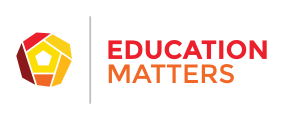By: Rebecca Miller, AmeriCorps Tutor, Education Forward
When I was younger, school was about perfection. I excelled more from a fear of failure than from a desire to learn. I worked at a rapid pace to keep up with, and surpass, my fellow students. My attention was focused solely on decorating the tops of papers and tests with that ever coveted letter A. The education system pandered to my competitive spirit, and I taught myself to measure success on a scale of 4.0. School was about staying in front until graduation day. I learned to be an excellent test taker. My papers were grammatically superb, if not critically memorable. Onward I raced, ever following the path to that glorious finish line, to that beautiful end where my efforts would finally be fulfilled with a mortar board, tassel, and stole.
The day arrived, my transcript and resume were perfect, but my bank of knowledge did not match. When I started college, I realized that my public education had taught me a lot about being good in school, but I did not really embody the role of perfect student I had always claimed. It was not that the information had not been there, I had a myriad of excellent and dedicated teachers all through my life. However, school had always meant school, and I had not yet begun to hone any sort of ability to convert that information to life.
As cliché as it sounds, life changed for me in college. It is true that I “found myself” and that those were “the best years of my life,” but those phrases are simply byproducts of what actually took place during my four years at Chapman University.
In short, I began to grow up.
For the first time in my life, school meant more than grades. I was no longer fueled by a fear of failure; instead, I began to cultivate an intrigue about the world around me. I branched out in my interests, taking classes on philosophy, physiology, and anthropology. I began to develop of worldview of my own, and I began to apply the information I was learning to the world at large. Suddenly, I saw myself as a global citizen, and the information that I garnered in class I felt obligated and excited to incorporate into my everyday life.
I excelled in grade school because I figured out how the system worked, and I fit myself neatly into it. However, it has only been in my adult life that I have begun to use the knowledge I have gained to discover flaws in that system, and attempt to overcome them.
I think that we, as adult educators, are privy to a great source of potential. For a long list of unique reasons, this country’s school system failed our students. With so much focus on passing tests, on earning good grades, and on filling transcripts with irrelevant numbers, there are multitudes of people who got lost along the way. However, in the adult education world, they find a second chance. Not only do they have a second chance to cross that finish line with an earned GED, but they also receive a second chance to approach learning in a different way. Life experience taught me the importance of education in an ever-changing world, and life experience is something that our students have in multitude. Now it is their turn. The teenage angst is behind them, the previous apathy is negligible, and the desire to succeed is strong.
As educators, we must focus on the beauty of relearning old information with new eyes, and we must help our students see that this is not about passing or failing, this is not about the test. Knowledge is how we survive in this world, no matter what form that information takes. There are very few things in life that are more gratifying than realizing the knowledge you possess is worth something. Passing the test should not be the end; rather, it should be the tangible proof of personal empowerment.
Passing the test is simply the beginning.
